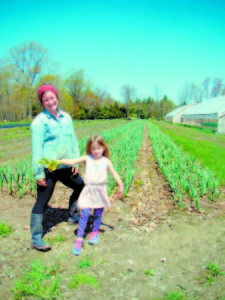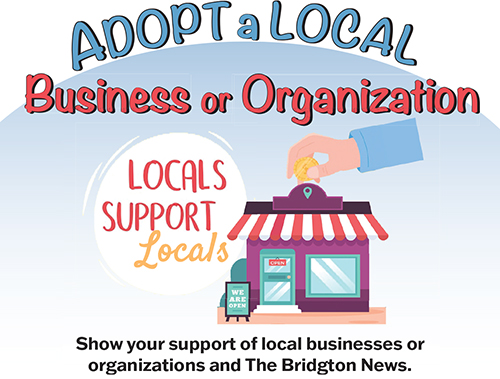Patch Farm — Happiness is … sustainability

LIVING OFF THE LAND — Brenna Mae Thomas-Googins and her daughter Ainsley, four, pose in front of rows of garlic growing outdoors on Patch Farm located in Denmark, about a half-mile from the Bridgton town line. (De Busk Photo)
By Dawn De Busk
Staff Writer
DENMARK — Not everyone gets support through silence.
“When I told my family that I was going to go to college for farming, they said, ‘Finally, you figured it out. We have known for years,’†said Brenna Mae Thomas-Googins — the co-owner of Patch Farm in Denmark and one of the organizers of the Bridgton Farmers Market.
“How fortunate I am that they didn’t tell me. They let me figure it out. If they had told me what to do for a career, I might have rebelled,†she said.
At the time, she had dropped out of college and traveled with her sister to Ireland, where they lived the farm experience through World Wide Opportunities on Organic Farms (WWOOF). While a vacation might stand out as a person’s fondest memories, it seemed that the farming involvement was actually the highlight that made Brenna feel in harmony with life.
So, it was no surprise to people around her when her goals shifted in the direction.
At 32 years old, Brenna Mae is living what she considers her dream — running a farm that is both a business and a lifestyle. Her significant other Brandon McKenney focuses on the care of the animals and the maintenance of equipment while Brenna turns her attention to what grows in the garden as well as supervising volunteers and workers who help at harvest time.
The couple has a four-year-old daughter named Ainsley; and the family grows or raises about 80 percent of their own food.
“Right now, the food we eat is 80 percent grown or made by us. We even use our own corn to make corn meal. We grow our own oats to make granola. That is why we have the goats. We drink the goat’s milk, make our own yogurt and make our own cheese. It is a lot of man hours. But it’s totally worth it,†she said.
What they buy is limited to flour from Maine, sugar from Florida and the occasional avocado or orange around Christmas time.
“Sustainability can mean something different to everybody. To us, this is our version of sustainability. For us, sustainability is not just raising our own food. We are sustaining ourselves in happiness. We are sustaining our bodies, our souls, our minds, and our place in the community,†she said.
“Since moving to Denmark, to the Lake Region, the community has been amazing,†she said, commenting that so many people are into the rural lifestyle. Also, people have stopped by to tell them how happy they are the once vacant farmhouse and land is being utilized once again. Neighbors swing by to pick up fresh eggs and comment on the Johnny Jump-Ups in the yard.
“It is amazing to meet other farmers who are sustaining who we are,†she said. “I can get lofty when talking about sustainability. But, for us, it is so big. That is why sustainability can be so different for everyone. Everyone doing a little thing here and there makes a difference. I know it is one of those things that people say but that is because it is true.â€
Patch Farm started five years ago in Hiram. Four years ago, they entered a lease-to-own agreement with the owner of a piece of farmland in Denmark, about a half-mile from the Bridgton town line.
The parcel is 67 total acres with 20 acres of open land. There are four acres where annual and perennial vegetables grow and there is about one-third of an acre dedicated to herbs. Patch Farm raises animals: 175 layer hens, 300 broilers per season, 26 goats and 22 hogs that run free in the woods.
“Patch Farm is not just to make money for Patch Farm. We are here to feed our neighbors. We are here to make this land better,†she said.
Some examples of improving the land are: using as little fuel as possible by doing the majority of tasks by hand instead of by machine; composting the manure of their farm animals to create fertilizer; and allowing the goats and chickens to graze on an over farmed portion of the land.
Patch Farm received a grant from National Resource Conservation Service, a federally-funded organization that was created after the Dust Bowl to make sure a farm’s natural resources are maintained properly. The grant was used to construct a compost pad to “help us correctly manage this thing that could be problem, to make sure our manure doesn’t run into the ground water, and pollute another waterway,†Brenna Mae said. “We can’t spread manure certain times of year because it’s too wet. Just like there are certain times of year, it would damage our land to run equipment on it.â€
Another way to revitalize the natural resources is to rotate their farm animals. In fact, the chickens appear to be part of a gypsy camp with their two chicken coops on wheels.
“When we moved onto this property, it hadn’t been properly farmed in 16 years. The front fields had been over-hayed. For the health of the animals and the fields and without buying (fill, soil and fertilizer) we made everything healthy again,†she said. “It is called intensive management, which means too many animals in a small space. Because we rotate the animals, it forces them to eat everything, instead of being selective. It encourages the goats to eat a diverse diet. The goats eat all of the tall forage. They leave behinds their gifts (manure) and they might leaving behind parasites.â€
Then, a few days later, the chickens are moved to the place where the goats were. The chickens like the shorter grass, which allows them to find more insects, to scratch at the soil, to take dust baths which keep the chickens healthy.
“While the chickens are doing everything to eat, they are fertilizing as they go,†she said. “It fosters healthy grass. And soon we will be able to grow hay there.â€
“Everything is woven together. In the 1400s, it was a way of survival. Now, it is something you have to work at to find. In this present community, it is amazing to see — there it is,†Brenna Mae said.
“I am really blessed. My daughter Ainsley is going to know all of this. She is going to know it because it’s part of our everyday life. She might want to farm here in the future and if she doesn’t that is okay.â€


